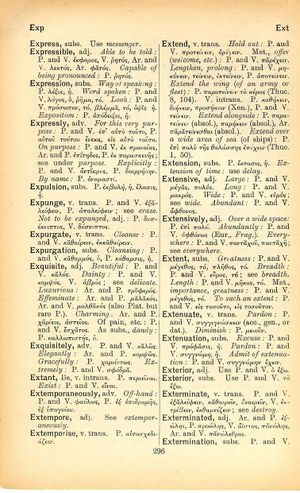exterior: Difference between revisions
From LSJ
ἡγούμενος τῶν ἡδονῶν ἀλλ' οὐκ ἀγόμενος ὑπ' αὐτῶν → of his pleasures he was the master and not their servant
(D_4) |
(Gf-D_4) |
||
| Line 1: | Line 1: | ||
{{Woodhouse1 | {{Woodhouse1 | ||
|Text=[[File:woodhouse_296.jpg|thumb|link= | |Text=[[File:woodhouse_296.jpg|thumb | ||
|link={{filepath:woodhouse_296.jpg}}]]'''adj.''' | |||
Use P. and V. ὁ [[ἔξω]]. | Use P. and V. ὁ [[ἔξω]]. | ||
'''subs.''' | '''subs.''' | ||
Revision as of 07:20, 14 August 2017
English > Greek (Woodhouse)
adj.
Use P. and V. ὁ ἔξω. subs. Use P. and V. τὸ ἔξω.
Latin > English (Lewis & Short)
extĕrĭor: us, v. exter, II.
Latin > French (Gaffiot 2016)
extĕrĭor, ĭus, gén. ōris, compar. de exter, plus en dehors, [ou en parl. de deux] le plus extérieur : Cic. Tim. 25 ; Cæs. G. 7, 74 ; 7, 87, 4 ; C. 3, 63, 6 ; comes Hor. S. 2, 5, 17, compagnon qui laisse à l’autre le haut du pavé.

